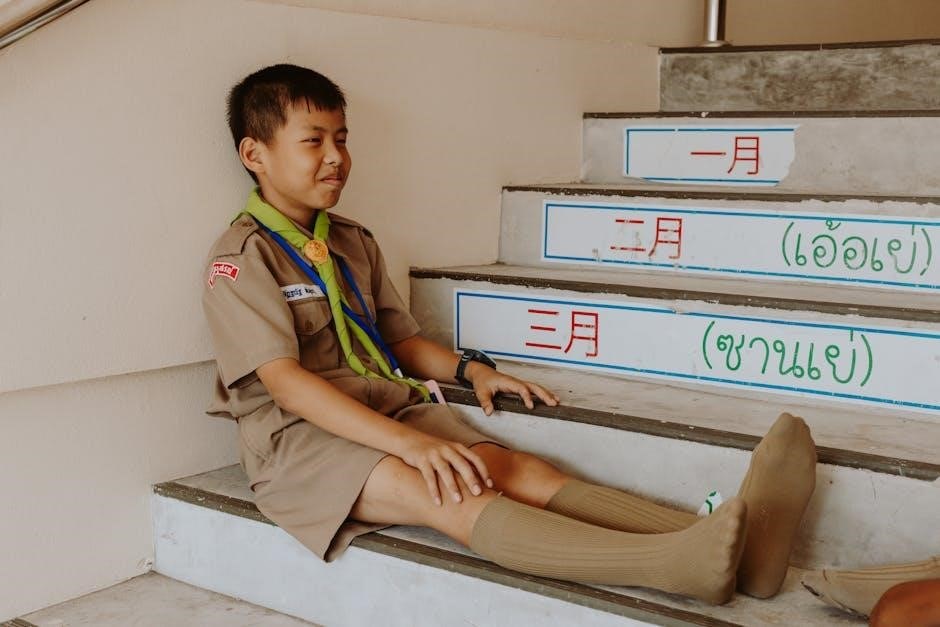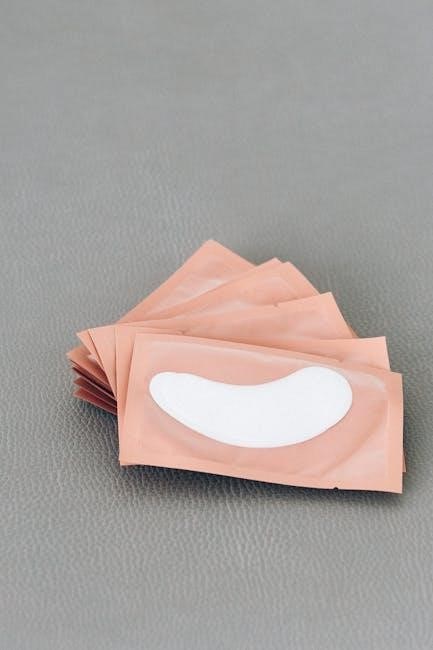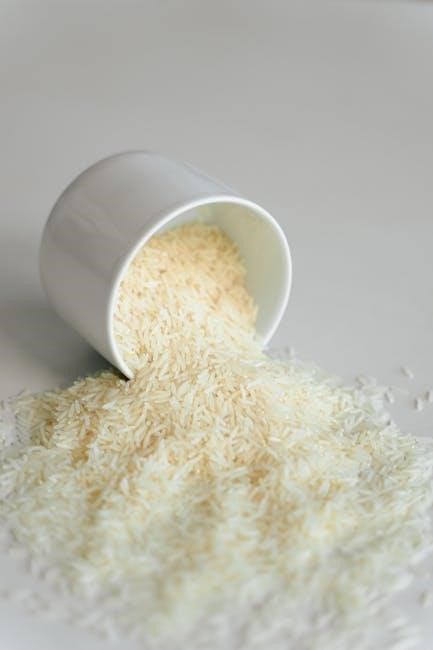The Cub Scout 6 Essentials are fundamental items every Cub Scout should carry during outdoor activities. These include water, food, a first aid kit, extra clothing, sun protection, and a whistle. They ensure safety, preparedness, and comfort in various scouting adventures.

Importance of the Cub Scout 6 Essentials

The Cub Scout 6 Essentials are vital for safety, preparedness, and comfort during outdoor adventures. They ensure Scouts can respond to emergencies, stay hydrated, and navigate challenges confidently, fostering resilience and readiness in all scouting activities.

Why the Six Essentials Are Crucial for Every Cub Scout
The Cub Scout 6 Essentials are designed to ensure safety, preparedness, and comfort during outdoor adventures; Each item plays a critical role in addressing basic needs and emergencies. Water keeps Scouts hydrated, while food provides energy for activities. A first aid kit is vital for treating minor injuries, preventing infections, and ensuring health. Extra clothing offers protection from changing weather conditions and unexpected spills or tears. Sun protection, including sunscreen and hats, prevents sunburn and heat-related issues. Lastly, a whistle serves as a reliable signaling device to call for help or stay visible in case of separation. Together, these essentials empower Cub Scouts to handle challenges confidently, fostering resilience and responsibility. By carrying these items, Scouts learn to prioritize their well-being and the well-being of others, making them indispensable for every outing. These skills and habits not only enhance safety but also build character and readiness for future adventures.

The Cub Scout Six Essentials in Detail
The Cub Scout Six Essentials are six critical items designed to ensure safety and comfort during outdoor adventures. They include water, food, a first aid kit, extra clothing, sun protection, and a whistle. Each serves a vital purpose.

Water
Water is the most essential item among the Cub Scout Six Essentials, as it is vital for hydration, especially during physical activities like hiking or camping. Dehydration can quickly lead to fatigue and health issues, making water indispensable. Scouts should carry at least one gallon of water per person per day for drinking and basic hygiene needs. A refillable water bottle or hydration bladder is ideal for easy access and space efficiency. Leaders should emphasize the importance of regularly checking water supplies and ensuring they are clean and safe for consumption. Additionally, Scouts should be taught basic water purification methods, such as using water filters or purification tablets, as part of their outdoor skills training. This ensures they can safely obtain water if needed during extended trips. By prioritizing water, Scouts can maintain energy levels, stay healthy, and enjoy their adventures without unnecessary risks. Proper planning and education on water management are crucial for every Cub Scout outing. Always remind Scouts to drink water regularly to avoid dehydration, especially in hot or strenuous conditions. Water truly is the cornerstone of the Cub Scout Six Essentials, ensuring safety and well-being in the great outdoors. Cub Scout leaders play a key role in teaching this vital skill to their members. Through practice and repetition, Scouts will understand the importance of water preparedness. This knowledge will not only benefit them in Scouting but also in their daily lives. By mastering water management, Scouts develop a strong foundation for all outdoor activities. Always remember, water is life, and preparation is key to a successful adventure.
Food

Food is a critical component of the Cub Scout Six Essentials, providing the energy needed for outdoor activities. Scouts should carry lightweight, non-perishable snacks such as energy bars, trail mix, or dried fruits. These options are easy to pack and offer sustained energy. It’s important to consider dietary restrictions and preferences when selecting food items. A small, portable stove or camping grill can be useful for preparing meals, but Scouts should always follow safety guidelines when cooking outdoors. Packing extra food is recommended in case of unexpected delays. Leaders should teach Scouts how to properly store food to avoid attracting wildlife, using airtight containers and securing trash. Additionally, Scouts should learn basic meal preparation skills, such as building a campfire safely and cooking simple meals. Food not only fuels the body but also boosts morale during adventures. By planning and packing wisely, Scouts can ensure they have the nourishment needed to enjoy their experiences fully. Remember, food preparation and storage are key to a successful and safe Cub Scout outing. Proper planning prevents hunger and keeps everyone energized throughout the day. Always emphasize the importance of bringing enough food and water for the duration of the trip. This ensures that every Scout remains healthy and happy during their adventures; Food is not just about sustenance; it’s about teamwork and preparation, essential skills for every Cub Scout. By mastering food management, Scouts develop a strong sense of responsibility and readiness for any challenge.
First Aid Kit
A well-stocked first aid kit is one of the most essential items in the Cub Scout Six Essentials. It ensures that minor injuries, such as cuts, scrapes, or burns, can be treated promptly to prevent more serious issues. A basic first aid kit should include adhesive bandages of various sizes, antiseptic wipes, gauze pads, medical tape, and any medications that might be needed, such as pain relievers or antihistamines for allergic reactions. Additionally, including a small pair of gloves can help protect the person providing first aid from potential germs. Scouts should learn how to use each item correctly and understand the importance of cleanliness when treating injuries. It’s also a good idea to customize the kit based on the specific needs of the group, such as including extra supplies for blisters or insect bites. Regularly checking the kit to ensure it is fully stocked and that no items are expired is crucial. A first aid kit not only provides peace of mind but also teaches Scouts valuable skills in caring for themselves and others. By being prepared, Scouts can respond confidently in case of an emergency, making the first aid kit an indispensable part of their outdoor adventures. Always remember, safety starts with being ready to handle the unexpected.
Extra Clothing
Extra clothing is a vital component of the Cub Scout Six Essentials, ensuring Scouts remain comfortable and prepared for unexpected situations. Including an extra shirt, pair of pants or shorts, socks, and underwear is recommended. A lightweight rain jacket or hat can also be beneficial, depending on the weather. Scouts should pack these items in a small, waterproof bag to keep them dry. It’s important to choose clothing that is lightweight and easy to carry, avoiding items that may add unnecessary bulk. Parents or leaders should guide Scouts in selecting appropriate clothing for the season and ensuring it fits well. Checking the weather forecast before packing can help tailor the clothing choices. Extra clothing not only provides comfort but also serves as a safety measure in case of unexpected wet conditions or temperature changes. By being prepared with extra clothing, Scouts can enjoy their outdoor adventures with confidence, knowing they have what they need to stay comfortable and safe. This practice teaches them the value of preparedness and self-care in various environments.
Sun Protection
Sun protection is a crucial part of the Cub Scout Six Essentials, ensuring Scouts stay safe and comfortable during outdoor activities. This includes items like sunscreen, a hat, and sunglasses. Sunscreen should have a Sun Protection Factor (SPF) of at least 30 and be reapplied every two hours or after swimming or sweating. A wide-brimmed hat helps shield the face, neck, and ears from direct sunlight, while sunglasses with UV protection safeguard eyes from harmful rays. Additional items like lip balm with SPF can also be included to protect against sunburn. Scouts should apply sunscreen before heading outdoors and reapply as needed. Teaching Scouts the importance of sun protection helps prevent sunburn, heat exhaustion, and long-term skin damage. Encouraging these habits fosters a lifelong commitment to outdoor safety and wellness. By packing sun protection essentials, Scouts can enjoy their adventures without discomfort, ensuring a positive experience in nature. This practice emphasizes the value of preparedness and health-conscious behaviors, essential for all outdoor activities.

Whistle

A whistle is the final and equally vital item among the Cub Scout Six Essentials. It serves as a critical tool for signaling help in case of an emergency. Unlike calling out, which can tire the voice, a whistle is loud and consistent, making it easier to locate someone in distress. Scouts are taught to use a whistle in specific patterns, such as three short blasts, which universally signal the need for assistance. This method ensures clarity and reduces confusion. Additionally, whistles are lightweight and easy to carry, making them an ideal addition to any Cub Scout’s kit. Encouraging Scouts to always have a whistle on hand reinforces the importance of safety and preparedness. It also teaches them responsible use, ensuring it is only utilized in genuine emergencies. By including a whistle in the Six Essentials, Scouts gain a reliable means of communication and security, fostering confidence during outdoor adventures and campouts. This simple yet effective tool underscores the Cub Scout commitment to being prepared and aware of their surroundings at all times. Its inclusion is a testament to the organization’s focus on safety and readiness.
Preparing the Cub Scout Six Essentials
Regularly check and update the Six Essentials to ensure they are in good condition. Pack them neatly, keeping items accessible and organized. This practice ensures Scouts are always ready for adventures and emergencies, promoting safety and confidence.
How to Check and Maintain the Essentials
Regularly inspect each item in the Cub Scout Six Essentials to ensure they are in good condition and suitable for use. For water, check for leaks and ensure the container is clean. Food should be non-perishable and within its expiration date. The first aid kit must be fully stocked with bandages, antiseptics, and any medications specific to the Scout’s needs. Extra clothing should be appropriate for the season and kept dry. Sun protection items like sunscreen and hats should be in good condition. The whistle should be loud and functional. Replace any worn or expired items promptly. Organize a routine check before each outing to maintain readiness. This practice helps prevent issues during adventures and ensures Scouts are always prepared. Proper maintenance of the essentials is a key part of responsible scouting and promotes safety and confidence.
Best Practices for Packing the Essentials
Packing the Cub Scout Six Essentials requires careful consideration to ensure they are accessible, organized, and protected. Start by using a durable, water-resistant backpack or bag to keep items dry and clean. Place heavier items like water and food at the bottom for balance and stability. Distribute the essentials evenly to avoid overloading one section. Keep frequently needed items, such as the first aid kit and whistle, in easy-to-reach pockets. Use small, resealable containers or ziplock bags to store food and prevent spills. Label each item clearly so they can be quickly identified. Consider the weather and activity type when packing extra clothing, selecting layers that can be easily added or removed. Fold clothes neatly to save space and reduce wrinkles. Ensure the bag is not too heavy for the Scout to carry comfortably. Finally, double-check that all six essentials are included before heading out. Proper packing ensures that every Scout is prepared for a safe and enjoyable experience. By following these practices, the essentials remain accessible and functional, supporting Scouts in their adventures.

No Responses